Genesis I’m a Stranger Here Myself

Chayei Sarah (Genesis 23:1–25:18)
“People are strange when you’re a stranger. Faces look ugly, when you’re alone.” —Jim Morrison, The Doors
Jim Morrison’s classic lyrics from his bout with depression in 1967 have been playing in my mind recently. There is so much that is unsettling about the time that we are in, as we come out of the pandemic, but don’t. We are meeting in person now, but skittishly. We smile through our masks and hug, and then back up to six feet away. It all feels so strange.
Our tradition pays a good deal of attention to the experience of strangeness, and to the feelings of the stranger. We are told, over and over, “Do not oppress the stranger, for you yourselves were strangers in the land of Egypt.” What does it mean to feel like we are not where we belong, and what is it to persist despite this feeling? Where does the Jewish emphasis on the strange and the stranger begin?
Two weeks ago, we encountered in Lech Lecha the Torah’s first usage of the word גֵר (ger), stranger. God has come to Avram (not yet Avraham) in a vision to strike up the covenant which lies at the heart of our history. By way of introduction, we read:
וַיֹּאמֶר לְאַבְרָם יָדֹעַ תֵּדַע כִּי־גֵר יִהְיֶה זַרְעֲךָ בְּאֶרֶץ לֹא לָהֶם וַעֲבָדוּם וְעִנּוּ אֹתָם אַרְבַּע מֵאוֹת שָׁנָה׃
And God said to Avram: Know well that your descendents will be strangers in a land not their own, and will struggle there for four hundred years. (Genesis 15:13)
Notice here the word גֵר (in bold), meaning stranger. The destiny of our people, part of the accord formed between God and our first patriarch, includes being isolated and displaced, planted in unfamiliar soil. God goes on to promise Avram that eventually his descendants will go free, and will prosper, and that a homeland will be theirs. Yet this sense of struggle will remain in our collective soul, and will form part of our communal identity.
The emphasis on treating the stranger with kindness is the moral core of empathy. When God teaches us repeatedly not to oppress the stranger—because we know the feelings of the stranger—we are called to rise above the human impulses of indifference, insularity, and revenge. As Rabbi Shai Held wrote:
The Torah could have . . . said, since you were tyrannized and exploited and no one did anything to help you, you don’t owe anything to anyone; how dare anyone ask anything of you? But it chooses the opposite path: Since you were exploited and oppressed, you must never be among the exploiters and degraders. You must remember what it feels like to be a stranger. Empathy must animate and intensify your commitment to the dignity and wellbeing of the weak and vulnerable.
Our Torah returns and returns to this lesson in empathy.
This week, in Chayei Sarah, the word גֵר (ger), stranger, returns. Sarah has just died, and our patriarch, now known as Avraham, is in mourning. As he begins negotiations with the Hittites to purchase a cemetery plot for her he says these words,
“גֵּר־וְתוֹשָׁב אָנֹכִי עִמָּכֶם תְּנוּ לִי אֲחֻזַּת־קֶבֶר עִמָּכֶם וְאֶקְבְּרָה מֵתִי מִלְּפָנָי׃”
I am a sojourning stranger with you; grant me a burial plot with you, and let me bury my dead from before me. (Genesis 23:4)
After the trauma of the Binding of Isaac, and the death of his beloved wife, Avraham comes to feel like the stranger God predicted his descendents would be. His life has begun to feel like it doesn’t quite fit.
Yet he persists. Perhaps in this experience of being a גֵר, he begins to develop some remorse, and even empathy. His life is nearing its end. He is broken in so many ways, yet he tries to repair what can be repaired. He sends his servant Eliezer to find a wife for poor, beloved, traumatized Yitschak. His intuition about finding Yitschak a wife from his homeland, the land he left just two parshiyot ago, proves canny; Yitschak is finally happy, with the woman he loves. Avraham makes every effort to protect Yitschak from further pain. And when he dies, his estranged sons, Yitschak and Yishmael, unite to bury him, in the very field where he first became a stranger.
Looking for these slivers of hope in a complicated and bleak landscape infuses the experience of the stranger, of strangeness, with value. When we can persist and lift up the moral qualities that make for compassion and concord, we redeem the pain of the strangeness we face, the strangeness we have always faced. Like Avraham, we can seek to use the difficulties of our current reality to awaken empathy, and to inspire us, too, to repair what can be repaired.
Naomi Gurt Lind has been an opera singer, a synagogue executive and a stay-at-home mother, and is currently in Shanah Bet at the Rabbinical School of Hebrew College. In addition to her studies, Naomi sings with the Zamir Chorale, serves on the LimmudBoston Board of Directors, and volunteers at JCDS, Boston’s Jewish Community Day School. When she has a free moment, she enjoys solving crossword puzzles (in pencil!), writing divrei Torah on her blog Jewish Themes, and spending time with her hilarious and delightful children.
Want to learn more about our rabbinical program?


